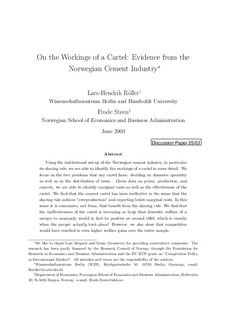On the workings of a cartel : evidence from the Norwegian cement industry
Working paper
Permanent lenke
http://hdl.handle.net/11250/162798Utgivelsesdato
2003-06Metadata
Vis full innførselSamlinger
- Discussion papers (SAM) [657]
Sammendrag
Using the institutional set-up of the Norwegian cement industry, in particular
its sharing rule, we are able to identify the workings of a cartel in some detail. We
focus on the two problems that any cartel faces: deciding on domestic quantitiy
as well as on the distribution of rents. Given data on prices, production, and
exports, we are able to identify marginal costs as well as the effectiveness of the
cartel. We find that the cement cartel has been ineffective in the sense that the
sharing rule induces ”overproduction” and exporting below marginal costs. In this
sense it is consumers, not firms, that benefit from the sharing rule. We find that
the ineffectiveness of the cartel is becoming so large that domestic welfare of a
merger to monopoly would in fact be positive at around 1968, which is exactly
when the merger actually took place! However, we also show that competition
would have resulted in even higher welfare gains over the entire sample.
Utgiver
Norwegian School of Economics and Business Administration. Department of EconomicsSerie
Discussion paper2003:25
